Main Menu
Latest Blog Entry
User login
Manual of Physical Training -1931
Army Physical Training Manual
The British Army used to produce some excellent training manuals. My copy of the 1931 manual contains many pertinent coaching points.
It is worth considering what has gone before us. Whilst the weaponry may have changed in the past 90 years, the human body and psyche remain fundamentally the same.
Individualisation of training is an old concept
Consider this:
“1 The Physical training of army boys cannot be undertaken without first 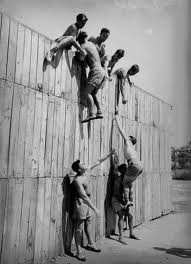 considering their individual character. Collectively they can be said to possess the definite ambition to function as soldiers from the very start of their careers; consequently they have a strong inducement to exert the necessary effort required for the progress.
considering their individual character. Collectively they can be said to possess the definite ambition to function as soldiers from the very start of their careers; consequently they have a strong inducement to exert the necessary effort required for the progress.
By reason of their youth, they are active, energetic, healthy and have acquired some idea concerning discipline; but their will power, and with it their character requires to be trained in the right direction.
The importance of this factor must be realised by all instructors, who should set themselves the task of developing each individual character rather than forcing all into a uniform pattern.”
How about “functional fitness or “cool exercises”?
- “The exercises employed in a system of physical training, if they ensure as they should the harmonious development of the whole body, will at the same time correct the faults engendered by one-sided work and so put the body in a better state to perform any other work that may be required of it.
- At the same time as he develops his body he must be taught to realise that he himself achieves this by his own effort, and is merely guided by his instructor. Interest in the possibility of his own power and the capacity to produce that power beget self- effort. Self-effort can therefore be produced.
- It must be borne in mind that the performance of the various exercises is only a means to an end and that training is not merely for the sake of the exercises themselves but for the ultimate effects of those exercises.”
In those 3 paragraphs you have a basic guideline for people who are beginning to coach:
- Have a systematic plan
- Engage and educate the athlete so they motivate themselves
- Remember that their ultimate goal is to do well at their sport, not be gym rats.
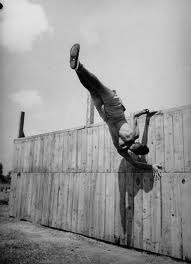
Guidance for the Physical Training Instructor
“The Instructor should remember that exercises which are well known to him, and which have become easy by practice, are new and often difficult to the pupil. he must not, therefore, be impatient of faults, neither must he expect perfection of execution too soon.
Any endeavour to obtain correctness of execution too suddenly is contrary to all sound principles of physical training.
Just as the progress of the recruit from week to week and month to month should be steady and gradual, so also should the correction of faults in each exercise be gradual. All the faults in an exercise should not be corrected at once, but the most important faults should first be put right, and later on those of less importance.
The capabilities of the men must be carefully observed, and judgement must be exercised in deciding when to exact perfection of execution and when to be satisfied with a reasonable attempt.”
This is the essence of coaching!
Character development
“The characteristics which should be chiefly stressed are accuracy, self-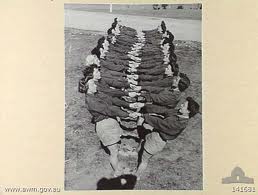 respect, energy , punctuality, obedience, tidiness and cleanliness.
respect, energy , punctuality, obedience, tidiness and cleanliness.
Of these, the first- accuracy- is perhaps the most important as it inculcates the habit of performing every act with precision. It should therefore be continually kept before the boys’ minds in order to perfect them through their own efforts.”
Again, character development is emphasised as heavily as physical development here- would we now call that “training to train”? This is what used to be taught in physical education classes in schools before they became games lessons.
3″ Over-enthusiasm leading to unnecessary strain must, however, be avoided, and exercises acting directly on the will, such as balance exercises should predominate. In particular the absolute control of the body should be insisted on after any agility exercises have been performed.”
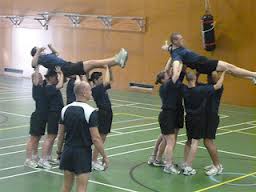 4 “Throughout the whole training the instructor must study each individual, and must never lose sight of the fact that he has in his hands the power to advance or curtail the development of the boy’s character.”
4 “Throughout the whole training the instructor must study each individual, and must never lose sight of the fact that he has in his hands the power to advance or curtail the development of the boy’s character.”
It is this last aspect of coaching that is predominant in a lot of sports, but is missing in strength and conditioning coaching– Young people are not just guinea pigs or numbers on a spreadsheet.
A lot can be learnt from these old texts, and a systematic approach to coaching, education and physical development is the most important thing for me.
Further Reading: See how the Army influenced Gymnastics in schools.
Client Testimonials
James is an excellent and experienced Strength and Conditioning Coach. He is able to draw on these experiences to adapt and meet each client’s specific needs. James is known for his engaging and dynamic style that has proved effective in producing results. Having worked with James, he is both organized and efficient. He also is an evidence based practitioner happy to engage in debate and take on new ideas. James rightly demands high standards and a good work ethic which reflects his own contribution to each situation
More


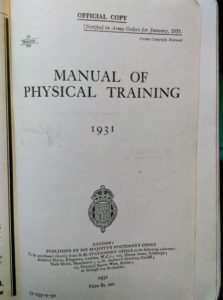
Comments
[…] (Continued from Part 1) […]